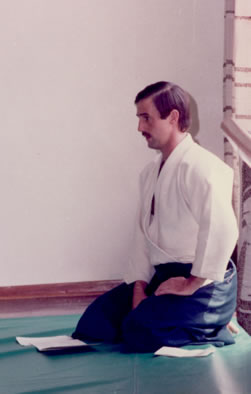
Related
|
|
Aikido is non-resistance. As it is non-resistant, it is always victorious. Morihei Ueshiba
|
Chris Smart Sensei, AFSA’s Chief resident Instructor 1981-1983
I have been a close student, colleague and friend of Chris Smart Sensei since 1981 and would like to give recognition and present him to my friends and students in the following pages. I would like you to remember his important contribution to help establish Aikido in South Africa.
-- Paul de Beer
 Chris Smart Sensei’s study of martial arts began in 1966, when, at the age of thirteen he joined a Judo club, located at Whitley Bay Boys’ Club, Northumberland, UK. For the next five years, he continued to learn Judo and also studied Karate. During this period, he encountered Aikido, which eventually, became the main focus of his practice.
Chris Smart Sensei’s study of martial arts began in 1966, when, at the age of thirteen he joined a Judo club, located at Whitley Bay Boys’ Club, Northumberland, UK. For the next five years, he continued to learn Judo and also studied Karate. During this period, he encountered Aikido, which eventually, became the main focus of his practice.
In the 1960’s, only a few years had elapsed since O Sensei first dispatched instructors from Hombu Dojo to spread his art overseas, a young uchideshi, Kazuo Chiba Sensei, came to the UK. On arrival, Chiba Sensei spent a considerable period in the North East, before moving to London. For this reason, Aikido of a good standard was being practised in the area.
In the early 1970’s, Smart Sensei spent some time in the British Army with the Parachute Regiment. His service included three tours of duty in Northern Ireland.
After leaving the Army in 1975, Smart Sensei fulfilled an ambition by going to Japan to study at Aikido World Headquarters, in Tokyo.
At that time, it was six years after the demise of O Sensei and his son, Kisshomaru Ueshiba was in charge. All the senior instructors had studied directly under the Founder.
Smart Sensei had not acquired a formally recognized Aikido rank in the UK and so took examinations for all the Kyu grades, Shodan, Nidan and Sandan at Hombu Dojo.
Smart Sensei lived in an apartment about 100 metres from the Dojo and trained every day. After obtaining Shodan, Smart Sensei took additional private classes twice-a-week with Masuda Shihan.
During his time in Japan, Smart Sensei also travelled to Yamagata to train with Shirata Sensei and to Saito Sensei’s dojo in Iwama. He also visited Tanabe (O Sensei’s birthplace) to visit the Founder’s grave and memorial. In addition, he visited the dojos of Koichi Tohei and Gozo Shioda, students of the Founder who had developed their own Aikido organizations.
Smart Sensei participated in the Annual All Japan Aikido Demonstration at the Budokan on five occasions. In addition to his Aikido practice, Smart Sensei also took private classes in Iaido.
In the early part of his stay in Japan, he met (and later married) a South African. For this reason, he decided that when he left Japan he would spend some time in South Africa. Before leaving Japan in early 1981 he started corresponding with Paul de Beer.
Smart Sensei took a circuitous route back from Japan and taught Aikido classes in Hong Kong, Hawaii, Montana and Britain on the way to South Africa. On arrival in South Africa in mid-1981, he spent his first weeks in Bloemfontein, where his father-in-law was a Professor of Medicine at the University. After visiting Cape Town, Durban and Pretoria to assess the state of Aikido in the country, he decided to settle in the Randburg area of Johannesburg where he founded the Ferndale dojo. Paul de Beer and Fritz Zöllner became his students at this stage.
Smart Sensei took charge as AFSA’s “Chief resident Instructor” and official go-between AFSA, the BAF and Hombu during his stay (1981 – 1983). He taught regular classes in Johannesburg, Wits, Tukkies, Pretoria and also conducted several Aikido training camps throughout the country. Most of AFSA’s formal structures were devised under his direction and many students received recognized kyu grades from him during this period.
In the 1980’s, Black South Africans had very little opportunity to participate in Japanese martial arts training. In an innovative programme made by the SABC, which featured several arts, Smart Sensei, Paul and Fritz demonstrated Aikido.
Before leaving South Africa in December, 1983, Smart Sensei was able to promote Fritz to first kyu and received permission from Aikido Headquarters to award Shodan to Paul. He regards this as his most satisfying achievement during his time with AFSA. In 1988, Smart Sensei returned to South Africa to teach a national course at the Pretoria Technical College.
In order to ensure that Aikido in South Africa continued to prosper after his departure, Smart Sensei introduced the late Ken Cottier Shihan to AFSA. Both were close friends in Japan and remained in contact after they both returned to the UK.